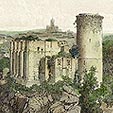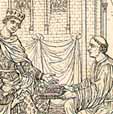![]() Normandy
and the Angevin Empire
Normandy
and the Angevin Empire
 Henry
II Plantagenet was King of England and the most powerful vassal of the King of
France holding half of his kingdom. Although it had a certain territorial
continuity from the north of England down to the south of France, the
Plantagenet state was made up of disparate parts, each retaining its own
original character, traditions and culture.
Henry
II Plantagenet was King of England and the most powerful vassal of the King of
France holding half of his kingdom. Although it had a certain territorial
continuity from the north of England down to the south of France, the
Plantagenet state was made up of disparate parts, each retaining its own
original character, traditions and culture.
 The Normandy where Henry frequently
stayed was the pivot of the feudal state created by the Plantagenets. This
situation was in particular to the advantage of the city of Caen, which was
well-situated for his journeys, and whose castle was the seat of the Court of
the Exchequer and the Royal Treasury. Henry
took back from the Dukes of Normandy the habit of dealing with the affairs of
Brittany upon which he imposed his tutelage. He did not hesitate long, however,
before employing the forces of the Duchy in the furthest flung adventures. In
1159 Henry required the feudal service of his powerful barons in an attempt to
have the County of Toulouse submit to his authority.
The Normandy where Henry frequently
stayed was the pivot of the feudal state created by the Plantagenets. This
situation was in particular to the advantage of the city of Caen, which was
well-situated for his journeys, and whose castle was the seat of the Court of
the Exchequer and the Royal Treasury. Henry
took back from the Dukes of Normandy the habit of dealing with the affairs of
Brittany upon which he imposed his tutelage. He did not hesitate long, however,
before employing the forces of the Duchy in the furthest flung adventures. In
1159 Henry required the feudal service of his powerful barons in an attempt to
have the County of Toulouse submit to his authority.
 Henry also inherited the conflict with the King of
France over the division of Vexin. He had had to abandon Norman Vexin at the
time when he gave homage to Louis VII for the Duchy of Normandy, but he
managed to take it back in 1160 in the dowry of Margaret of France who married
his son Young Henry. In
1169, when Henry II concluded a new peace with King Louis VII, he drafted a
plan for the sharing of his domain. He retained the English crown, and gave
his son Young Henry Normandy, Maine and Anjou. He gave Aquitaine to Richard
and Brittany to his other son, Geoffrey. Henry II then fell gravely ill and
confirmed the distribution in his will of 1170. By associating his elder son
with the English crown pending succession, he managed, however, to change the
entire state of Anglo-Norman affairs to his advantage. Having recovered from
his illness, Henry II retained the reality of power.
Henry also inherited the conflict with the King of
France over the division of Vexin. He had had to abandon Norman Vexin at the
time when he gave homage to Louis VII for the Duchy of Normandy, but he
managed to take it back in 1160 in the dowry of Margaret of France who married
his son Young Henry. In
1169, when Henry II concluded a new peace with King Louis VII, he drafted a
plan for the sharing of his domain. He retained the English crown, and gave
his son Young Henry Normandy, Maine and Anjou. He gave Aquitaine to Richard
and Brittany to his other son, Geoffrey. Henry II then fell gravely ill and
confirmed the distribution in his will of 1170. By associating his elder son
with the English crown pending succession, he managed, however, to change the
entire state of Anglo-Norman affairs to his advantage. Having recovered from
his illness, Henry II retained the reality of power.